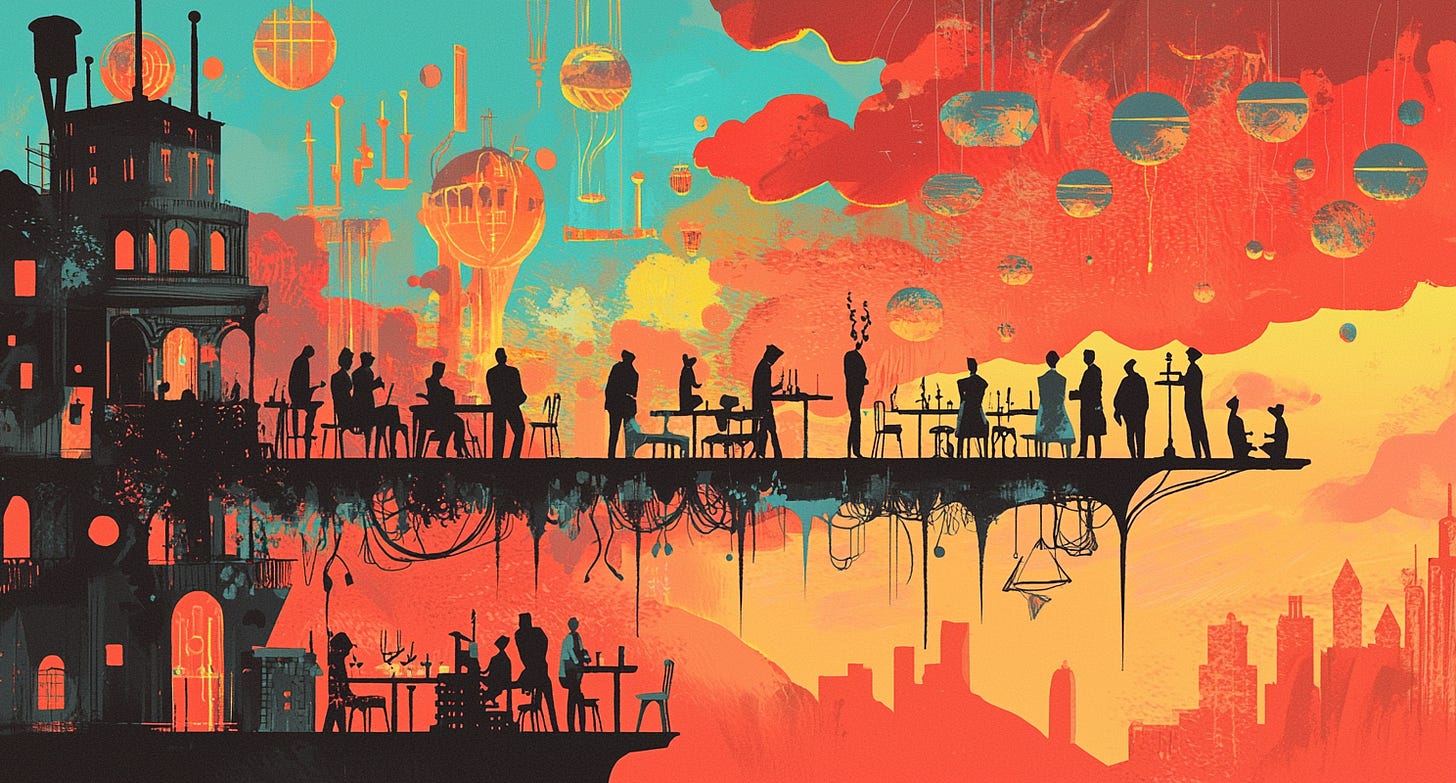Disclaimer: This post has been thoroughly vetted by the Ministry of Thought Alignment, and cross-checked by the Algorithmic Consensus Department. Any deviation from accepted truths has been promptly flagged and corrected by your friendly neighborhood Censorship Sentinels.
Greetings, My Marginalized Nephew Fidibus, and Fellow Outsiders of the Digital Consensus,
Before we dive into the creeping shadow of totalitarianism, allow me to commend you for still daring to think. In a world where dissenting voices are slowly fading, where even your most benign questions can get you shadowbanned or labeled a danger to the state, the mere act of reading this might be seen as subversive. Well done, you little rebel! Welcome to a world where thinking independently is tantamount to dissent, and dissent is… well, let’s just say it’s not exactly encouraged.
Mattias Desmet's Guide to the Psychology of Totalitarianism: How to Create a Conformist Paradise (or Hell)
Mattias Desmet has been poking the totalitarian bear for a while now. In his book, "The Psychology of Totalitarianism," he doesn’t just hint at the dangers of suppressing dissenting voices—he lays it all out like a morbid cookbook for aspiring dictators. Want to create a society where everyone marches to the same tune? Just follow these steps: first, marginalize the troublemakers; then, censor the contrarians; and finally, enjoy your shiny new world of uniform thought.
Step 1: Historical Recipe—Remove Dissent, Add Fear
Desmet reminds us that this playbook isn’t new. Take the Soviet Union under Stalin or Nazi Germany—two regimes that thrived on making dissent disappear faster than your social media posts on controversial topics. These regimes didn’t just argue with their critics. Oh no, they purged them—literally. Critics were exiled, imprisoned in gulags, or simply erased from existence. And when that wasn’t enough, they set up entire systems to make sure no new dissenters sprouted up.
For Stalin and his buddies, having a few “out of line” thinkers was like having termites in a house—if you don’t exterminate them, they multiply. So, they got rid of these pests with impressive efficiency. Whether it was mass censorship, or sending political opponents on one-way trips to Siberia, the goal was clear: total unity through total silence.
Step 2: The Modern Update—Algorithmic Censorship and Digital Exile
But hey, that was then, and we’ve evolved, right? Wrong. According to Desmet, we’re just using subtler tactics now. In the world of algorithmic echo chambers, dissent is quietly suffocated in the name of safety, public order, and the all-powerful community guidelines. These days, the Blob doesn’t need to send you to a physical gulag—they can just deplatform you, mark you as a conspiracy theorist, and watch as the digital mob erases your existence.
The modern totalitarian toolkit comes with user-friendly features like algorithmic filtering, shadowbans, and that lovely feature where posts critical of the dominant narrative simply vanish into the ether. Sure, you can speak out against the MegaMachine—just don’t expect anyone to hear you.
Step 3: The Pandemic Playbook—Science Is Settled (And So Are You)
Desmet’s analysis hits its stride with a chilling look at the COVID-19 pandemic. Remember when questioning lockdowns or vaccine policies made you a public enemy? Desmet argues that pandemic management wasn’t just about health—it became the perfect opportunity to push dissent into a dark corner. Scientists and doctors who dared question the mainstream approach found themselves labeled as dangerous spreaders of misinformation. In some cases, their platforms were restricted, and their careers evaporated faster than a Zoom call disconnect.
And let’s not forget the appeal to scientific consensus—because nothing screams totalitarianism quite like claiming there’s only one right way to interpret data, and any deviation is dangerous. The mere act of questioning became synonymous with heresy.
The Silent Descent: Where Dissent Goes to Die
The sad truth is that once dissident voices disappear—whether through physical repression or social media-induced cancellation—totalitarianism has fertile ground to grow. Desmet doesn’t sugarcoat it. Whether it’s through gulags or algorithms, the endgame is the same: create a society where nobody dares question the narrative. And once you’ve silenced dissent, people stop seeing alternative perspectives. They stop thinking critically. They become obedient soldiers in a war they never signed up for.
Desmet argues that the more we allow dissenting voices to be eliminated, the more totalitarianism creeps in, one algorithm at a time. Society becomes a monoculture, marching in unison toward a future where freedom of thought is replaced with freedom from thought. This is where the danger lies—not in the overt brutality of totalitarianism, but in its slow, subtle seduction.
The Blob’s Digital Gulag: How the Klowns Are Creating the Ultimate Silent Majority
If you think that only the Soviets or the Nazis perfected the art of erasing dissent, think again. The Blob has taken their playbook, sprinkled it with a dash of Big Tech magic, and voila! You get a digital gulag, where being wrong means being invisible. No need for secret police when the algorithmic enforcers are on the job.
And this isn’t just theory—it’s happening now. You say something outside the Overton Window, and suddenly you find your content being flagged, your posts mysteriously de-amplified, or worse, your account locked under the pretense of “community safety.” The message is clear: if you step out of line, you’re going down the digital drain.
Welcome to the Algorithmic Future: Where Science Is Always Settled (Until It’s Not)
Desmet drives this point home by examining the COVID-19 pandemic. Critical voices were locked out of the debate, and dissent was declared a public health threat. But here’s the kicker: science, by its very nature, is never settled. It thrives on challenge, on debate, on dissent. And yet, during the pandemic, we were spoon-fed the lie that questioning the mainstream position was not only dangerous—it was borderline treasonous.
Pandemic management morphed into a battle for control, where only those who toed the line were given a voice. As Desmet points out, this paved the way for totalitarian thinking, where alternative viewpoints were not just discouraged—they were crushed.
Silence is Golden (For the Blob)
Let’s be honest, Fidibus—the Blob loves a good silent majority. It makes their job easier. No need to justify policies, no need to respond to criticism, no need to engage in messy debates. A silent, obedient population is the ultimate goal of any totalitarian system. Whether it’s the old-school repression of the Soviets or the slick, algorithmic censorship of modern democracies, the strategy is the same: make the dissenters disappear, and you’ve got yourself a lovely little utopia of unquestioning conformity.
So what’s the solution? Speak out while you can. Question everything—especially when they tell you it’s settled. And remember: once dissent disappears, totalitarianism isn't far behind.
The Collective Mind Awaits
And there you have it, Fidibus—the Blob’s totalitarian dream is alive and well, dressed up in the cozy language of safety, unity, and consensus. It’s a brave new world, where the only thing you’re allowed to think is what they tell you to. But don’t worry, as long as you play along, you’ll never even notice the chains. Just make sure to question everything before the algorithms decide it’s too dangerous for you to think at all.
With a rebellious wink from somewhere outside the algorithm,
Uncle FrizzleBob
The Outlaw Hare Who Thinks Too Much
“In times of universal deceit, telling the truth is a revolutionary act.” – George Orwell
“Freedom is the freedom to say that two plus two makes four. If that is granted, all else follows.” – Winston Smith, 1984
Uncle FrizzleBob’s Thought-Rebel Brainfood
"The Psychology of Totalitarianism" by Mattias Desmet
Protopian Potential: Dive into Desmet’s brilliant analysis of how societies slip into totalitarianism, often without anyone noticing until it’s too late. From historical examples to modern digital mechanisms, this book is your survival guide for recognizing the warning signs before your thoughts are flagged for “re-education.”"Brave New World" by Aldous Huxley
Protopian Potential: Huxley’s dystopia is all too real now. Forget overt dictatorships—this is the story of a society so pacified by comfort and distraction that it doesn’t even need to be censored. Sound familiar?"1984" by George Orwell
Protopian Potential: Orwell’s vision of state surveillance and thought control is more relevant than ever. Big Brother doesn’t need to watch you anymore—your smartphone already does that for him."Manufacturing Consent" by Noam Chomsky and Edward Herman
Protopian Potential: The OG manual on how mass media manipulates public opinion and suppresses dissent. If you want to know how modern democracies quietly ensure totalitarian uniformity, this is your go-to guide."The Shock Doctrine" by Naomi Klein
Protopian Potential: Klein details how crises are exploited to consolidate power and marginalize dissenting voices. It’s not just about pandemics—it’s about disaster capitalism in full swing. Read this if you want to see how the Blob uses fear to tighten its grip.
Uncle FrizzleBob’s Totalitarianism Survival Tips
Keep a physical notebook—algorithms can’t read pen and paper.
Write down your thoughts the old-fashioned way, Fidibus. The Blob can’t censor what it can’t scan.Speak in code—or better yet, in person.
Face-to-face conversations with trusted comrades will never go out of style. The Blob hasn’t figured out how to wiretap your whispers… yet.Use alternative platforms—but be prepared for those to disappear too.
Escape the mainstream tech matrix while you can. Decentralized platforms might not last forever, but they’re your lifeline for now.Turn off notifications—the more distractions, the easier you are to control.
If you’re constantly being pinged, you’re not thinking critically. Turn off notifications, and reclaim your brain from the Blob’s grip.Question the settled—because nothing ever really is.
Whether it’s science, politics, or just the latest tech trend, never trust anyone who says “the debate is over.” Debate is freedom. And once that stops, you’re in totalitarian territory.
























Share this post